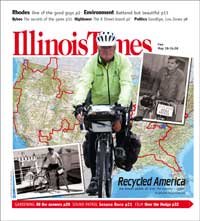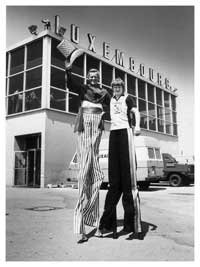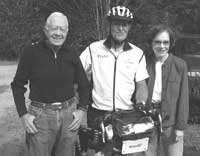Illinois Times Newspaper, Springfield, IL
article by Bruce Rushton May 18, 2006
posted with permission from the Illinois Times http://www.illinoistimes.com (Thank you!)
Article by : BRUCE RUSHTON brushton@illinoistimes.com
Cover Illustration by: MATTHEW SCHULTZ
Recycled America
Joe Bowen pedals all over the country - again

There comes a time in a man’s life
where he feels at ease in a hotel lobby across the street from the state
Capitol, dressed in a lime-green fluorescent jacket, black tights, and
nylon-mesh shoes that are something between ballet slippers and football
cleats.
Joe Bowen is anything but
in-between. He’s all-out — always has been. A former construction
worker, Bowen is a student of history and literature who can tell you
all about Miguel de Cervantes and John Steinbeck. Just look at his
bicycle, a Trek 520 with ungodly fat tires that marries two giants of
literature separated by more than four centuries.
“Rocinante” reads the well-worn
red lettering stuck to the bike’s dirt-caked frame.
“That’s the name of Don Quixote’s
horse,” Bowen explains. It is also, he adds, the name of Steinbeck’s
truck, which the author drove across America, recounting the journey in
the bestselling book Travels with Charley.
Quixote’s steed was a broken-down
nag, Steinbeck’s truck a 1960 GMC purchased new. Not quite two years
old, Bowen’s bicycle is, at least, the equal of either. It has taken him
to Canada. To Big Sur. To Mount Rushmore. To the Grand Canyon. To
Niagara Falls. To Gettysburg. And now, today, to Springfield, less than
2,000 miles from home and more than 12,000 miles since he started this
journey that defines meandering.
Bowen arrived last Friday after
battling wind and rain in an all-day ride from Beardstown. Most folks
think of it as a 46-mile jaunt. For Bowen, who eschews highways for back
roads, paved or not, it was a 58-mile trip. He’s spotted 19 statues of
Abraham Lincoln in Illinois and has taken photos of each one. His first
stop in Springfield is the Abraham Lincoln Presidential Library.
Not the museum. The library.
“I went straight to the library,
baby — that’s where the action is,” he says. “I can go over there to the
museum later.”
He had a bit of trouble persuading
the staff to let him stash his bicycle inside — he won’t let it out of
his sight for more than a couple of minutes — but eventually they
relented. Only at a cowboy museum in Wyoming was his bicycle refused
entrance. After more than a year on the road, Bowen is accustomed to
explaining that if Rocinante can’t go inside, he can’t, either. His
smile is lightning quick; his eyes have more sparkle than Santa’s. Top
it off with a friendly Kentucky drawl, and who could resist?
He found what he was looking for:
two letters from Lincoln that mention Felix Grundy Stidger, a Union spy
who infiltrated secret societies that sympathized with the South and
plotted to release Confederate prisoners of war. Here in the lobby of
the Statehouse Inn, Bowen marvels at Stidger’s little-known exploits and
tells of reading about him in Andrew Johnson’s presidential papers and
writings by U.S. Supreme Court Chief Justices Earl Warren and William
Rehnquist.
He speaks with the awed enthusiasm
of a man who has found some sort of Holy Grail. Perhaps he has.
He has seen the best and the worst
of America. Stayed up late talking with a woman who was airlifted out of
Vietnam as a small girl in 1975, with chaos all around. Visited a
little-known memorial to 9/11 victims at Arlington National Cemetery.
Rode into a storm and up a mountain pass at dusk rather than be gouged
for a motel room in a small town in Washington state, only to have a
restaurant owner offer him a spare room for $25 a few miles later.
Watched in amazement as a one-armed bicycle mechanic repaired Rocinante,
straightening the back wheel and fixing a sprocket that had been
improperly installed. Been fed and fêted by complete strangers.
To listen to Joe Bowen, his
stories of the road and of history, is to render superfluous the
question “Why?” Spending thousands of dollars on hotels, riding through
freezing rain, suffering in blazing sun, getting hit by a car, and
trusting that his 63-year-old knees will see him through.
It all makes perfect sense.
Bowen started this trip on April
8, 2005, in Lompoc, Calif. But, really, his journey began in 1967, after
his discharge from the U.S. Air Force. He still recalls the call he made
to his mother, back home in Kentucky.
I should be home in a year or so,
he remembers telling her. Confused, his mom asked why — after all, it
takes less than a week to drive to Kentucky from California. Well, he
answered, I just bought a bicycle and I’m going to ride home, but I’ve
got a few places I want to see on the way. His mom covered the receiver
with her hand, but he could still overhear what she said next. “I heard
her turn around and tell my dad, ‘There’s something wrong with this
guy,’ ” Bowen recalls.
After buying a Schwinn Super Sport
for $120 (nearly $700 in today’s dollars), he had just $43.85 in his
pocket. “I absolutely knew — instinctively — the American people would
help me do it,” he says. “And they did.”
Back then, cross-country cyclists
were rare — Bowen’s Schwinn now sits in a museum in Clay City, Ky. He
figured he could earn traveling money by cleaning truck stops and doing
other odd jobs, and he figured right. The longest he stayed in one place
was five weeks in Phoenix, where he painted a hotel. He wanted to see
national parks, presidential homes, and hydroelectric projects. “You
can’t do that without going over every mountain range in the United
States,” he says. Nor can such a trip be done in less than a year, which
explains the serpentine route he took, heading north in the spring and
south as autumn began so that he could winter in warm weather. He is
following this same route today. He had planned to set out next year, on
the 40th anniversary of his first adventure, but knee problems and
arthroscopic surgery convinced him of the need to start early, while he
still could.
He’s crossed the Continental
Divide 11 times, but, remarkably, the steepest hill he’s conquered is in
Illinois, near Galena, where Ulysses S. Grant once lived. He stopped at
the bottom just long enough to take a photograph of a sign denoting the
15-percent grade that lay ahead, then pedaled to the top. He was hit by
a car in Washington, D.C., but neither he nor his bicycle was seriously
hurt. He capped the accident by dodging traffic to retrieve his camera,
which fell out of his handlebar bag and landed in the middle of a busy
street. He didn’t think he had a choice. “That thing had about 500
pictures in it,” he says.
He was so broke during his first
journey that he shot just seven rolls of film. This time around, Bowen
has money for hotels, which constitute about a third of his planned
expenses. “I’m 63, man,” he says. “I can’t just roll up in a ditch
anymore.” About half of the money is coming out of his pocket; the
balance is from sponsors and donors. This is, officially, a trade
mission of sorts to persuade folks to visit the scenic byways of
Kentucky. He rode his way into shape, starting with a trip across
Kentucky that earned him recognition by the state Legislature (which,
naturally, allowed him to bring his bicycle onto the floors of the House
and Senate) and Gov. Ernie Fletcher, who presented him with an award
designating him a Kentucky Unbridled Spirit.
To be sure, Bowen isn’t alone in
his long-distance exploits. Heinz Stücke, for example, left his home in
Germany in 1962 and has never looked back. At last report, Stücke, 66,
was in England, where his trusty three-speed that has taken him through
every continent save Antarctica was stolen. The theft made headlines in
Canada, Australia, New Zealand, and New York, all of which Stücke,
deemed the world’s most-traveled man by Guinness, has visited on a
335,000-mile odyssey, the equivalent of circling the globe at the
equator more than 13 times.
Stücke, however, has never walked
across America on stilts, as Bowen did in 1980 to raise money for
muscular dystrophy research. The 3,000-mile trek took more than five
weeks, much of it spent in agony. “The blisters on my feet every night
looked like small tomatoes,” he says. “The first month out of
California, I really and truly thought I was going to die.” At first,
the Muscular Dystrophy Association ignored him, he says, refusing
requests for a letter from Jerry Lewis to lend credibility to the
venture. “We didn’t get any money to speak of until we got to Texas,” he
says. Then, a Jaycees club in Dallas gave him a $50,000 check and
challenged their counterparts in Oklahoma to match it. By the time Bowen
reached the East Coast, he had raised more than $100,000, and Lewis
invited him on the annual telethon, where he appeared with Johnny
Carson. “They were real interested when they found out I had a check for
$104,000,” he recalls.

Besides riding across America on a bicycle, Joe Bowen (left) has also
done it on stilts.
As a long-distance cyclist, Bowen
is built for comfort, not speed. He’s carrying a laptop computer,
anathema to weight-obsessed bicyclists, who typically cut off toothbrush
handles to shave fractions of ounces from their loads. A half-dozen pens
are jammed into the pockets of his handlebar bag. Did the batteries in
your digital camera die? No problem — Bowen reaches into his bag, pulls
out four AAs and tells you to keep them. He has spares.
Bowen is charisma personified,
spinning yarns and making instant friends. Consider how he enlisted the
support of the Appalachian Heritage Alliance in Kentucky, a
cultural-awareness and educational group that is sponsoring his trip.
David Musser, education director for the alliance, says Bowen just
walked up to him at a dedication ceremony for a cultural center in
eastern Kentucky and asked for help. “He starts telling stories about
riding huge distances and walking across the United States on stilts,”
Musser recalls. “My wife and I are looking at him, saying, ‘Who is
this?’ Every single thing was not only true but there were stories
behind those stories.”
By way of his laptop, Bowen is
sending dispatches to schoolchildren throughout Kentucky, where teachers
are free to incorporate his adventures into their curricula as they see
fit. Some use his travels as a starting point to talk about geography;
others use his messages to teach creative writing. He has received more
than 3,000 e-mails since his adventure began. His Web site includes
messages from more than 150 people, including police officers, park
rangers, and hotel clerks who’ve met him on the road. Strangers have
written, offering him meals and places to stay. Teachers have asked that
he visit their classrooms.
In Virginia, Bowen chanced across
a bicyclist at a grocery store who turned out to be a circuit judge who
once heard cases in the same Harper’s Ferry courthouse where the
abolitionist John Brown was tried and convicted. The judge guided him to
the courthouse on back roads only a local would know. In Washington,
D.C., he met with three congressmen from his state. Even former
presidents are not immune to Bowen’s charm.
In Plains, Ga., Bowen wasn’t shy
about asking whether he could meet Jimmy Carter when he stopped by the
former president’s house. The president isn’t here, a Secret Service
agent told him — but he’ll be back shortly. Within minutes, Carter and
his wife, Rosalynn, pulled up in a dark SUV, jumped out, and started
asking Bowen about his trip. Later that day, a man from New York arrived
in town with a seven-passenger tricycle. Naturally, Bowen was soon
aboard, encouraging bystanders to hop on and help pedal. Once again the
dark SUV appeared, and Carter climbed on the driver’s seat, piloting the
contraption down the streets of Plains.

Want to meet a former president? Just ask. That's
what Joe Bowen did in Plains, Ga.
What was perhaps Bowen’s most
unusual encounter occurred in Tennessee, where someone in a passing car
threw a soda can at him, striking him in his leg. In his online diary,
Bowen tells how he lost his temper, yelled a bit, then picked up the can
to put it in the next garbage can he saw:
About a mile up the road I saw the
car pulled into a small market. We were going to have a talk. I pulled
over near the car and a tall young man got out. “I am sorry, sir, I
didn’t mean to hit you.” “I can accept that,” I told him. “It takes a
pretty big man to stop and tell me rather than go on down the road.” I
pulled my book out and asked him to write something in it about what had
happened. This is what he wrote: 3/12/06 I, Ricky Lee Gray, apologize
for being out of control and throwing a can out of the window and
hitting this good man. Sorry. Ricky Gray. Ricky may never look at this
Web site, but he made my day. Ricky is a good man. Ricky had tattoos on
his arms and most of us would have judged him wrongly. Including myself.
But Ricky has good stuff in him and my hat is off to a man that can’t
laugh with his buddies and go on down the road.
The hardest day, he says, was the
first one, when he left his wife behind in California. “All of a sudden
you’re really doing, and you question your sanity,” he says. More than a
year and 17 flat tires later, he doesn’t seem crazy.
Not at all.
To read more about Joe Bowen’s adventures, go to www.ridejoeride.org.
